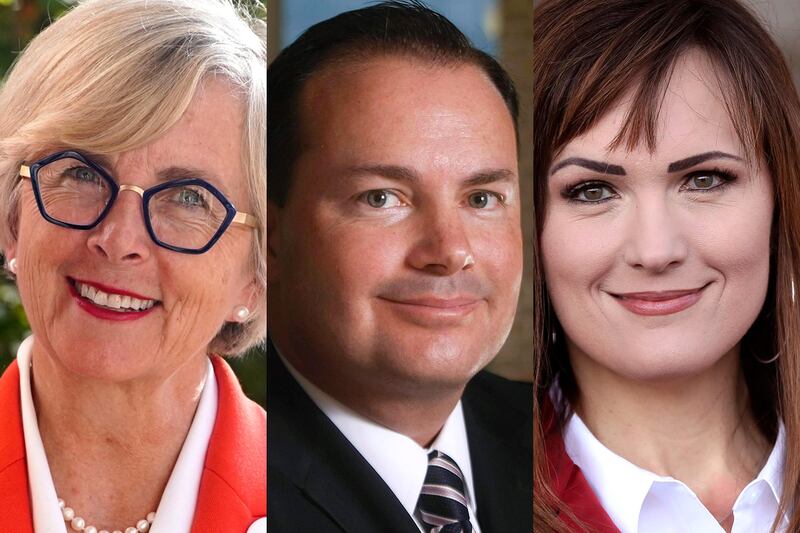A GOP Senate challenger says the Utah Republican Party asking candidates to hold off on committing to Utah Debate Commission debates next month might be a ploy to shield incumbent Sen. Mike Lee from the stage.
Late Tuesday, the Utah GOP Chairman Carson Jorgensen put out a statement saying the party should have more control over primary election debates.
“It is important that Republicans — and only Republicans — decide how the debates will take shape,” he said, including selecting moderators and deciding the issues to be discussed.
“It simply doesn’t make sense for the debate commission to decide what issues will be discussed and who will ask the questions,” Jorgensen said. “This is a Republican primary to be voted in by registered Republican voters.”
In an unprecedented move, Jorgensen encouraged Republican candidates to withhold confirming their participation until the Utah GOP and the debate commission settle those questions.
Ally Isom, one of two Republican candidates facing Lee in the June 28 primary, said she learned Tuesday night that Lee might not be available for the debate and that the party might be providing “air cover for his sudden unavailability.”
“I’ve been in politics long enough to know a scheme when I smell one. Some speculate Lee’s the one pulling the strings of our state GOP. Maybe it’s only a coincidence. Some speculate Lee’s unsure how to navigate a stage with two female challengers. Well, in 2022, I certainly hope that’s not the case,” she said in a statement.
Matt Lusty, Lee campaign spokesman, said Lee’s campaign team met with the debate commission on Monday and has until today to decide whether to participate.
“We love the idea of having Mike on stage. We’re still meeting to discuss our participation,” he said.
Isom said she is an official Republican candidate and has received no communication from the party about not participating in the debate.
“I’m pretty sure they have my cell number,” she said.
Lee received more than 70% of the delegate vote at the Utah Republican Party state convention last month, which would ordinarily make him the party’s nominee. Isom and Edwards gathered voter signatures to force him into a primary under the state’s dual nomination process.
Incumbents typically try to avoid debating challengers as much as possible. Jorgensen denied the Utah GOP is trying to protect incumbents in an interview Tuesday on KSL NewsRadio’s “Dave and Dujanovic” show.
“That’s not what it is at all,” he said.

Republican candidate Becky Edwards she welcomes the Utah GOP co-hosting the debate.
“However, the attendance of every Republican candidate is even more important. Debates play a fundamental role in the integrity of any election, and candidates, especially incumbents, owe voters the transparency and accountability needed to make an informed decision in the primary election this June,” she said.
Edwards later tweeted, “I’ve never known Mike to shy away from an opportunity to be on TV. Let’s have a debate!”
The Utah Debate Commission scheduled the televised Senate debate between Lee, Isom and Edwards for June 2 in Salt Lake City.
Created in 2013, the commission has two co-chairpersons from the Republican and Democratic parties and a board made up of representatives from five Utah television stations and eight public universities, as well as business and civic leaders. It has held primary election debates since 2018.
Debate commission co-chairman Wayne Niederhauser, a former Republican Utah Senate president, said the commission is moving ahead with the primary debates in the Senate race as well as the state’s four congressional districts.
“I think you just look at the history of the debate commission. Look at the primary debates we have sponsored in the past and it’s hard to argue, I think, that they weren’t fair, professional, transparent and independent,” he said on KSL NewsRadio.
Niederhauser said the commission focuses the debates on the issues of the day.
“The issues themselves are really nonpartisan. They’re points of debate. The partisan part is the responses to those issues,” he said.
Jorgensen said that because the primary involves only GOP candidates, the debate questions should revolve around issues important to Republicans and the party platform. He also said the moderator in an all-GOP debate should be favorable to Republicans.
“We want somebody who believes in the Republican Party and somebody who supports the Republican Party and actually likes Republicans to be moderating a Republican Party debate,” he said.
The Utah Republican Party might be taking its cues from the Republican National Committee, which recently pulled out of the Commission on Presidential Debates, claiming its biased against Republicans. It requires candidates to attest in writing that they will only appear at party-sanctioned primary and general election debates.
Jorgensen said the Utah GOP is looking at it the same way. “They were getting moderators who were not pro-Republican and we want to make sure that all of our candidates get a fair shot,” he said.


